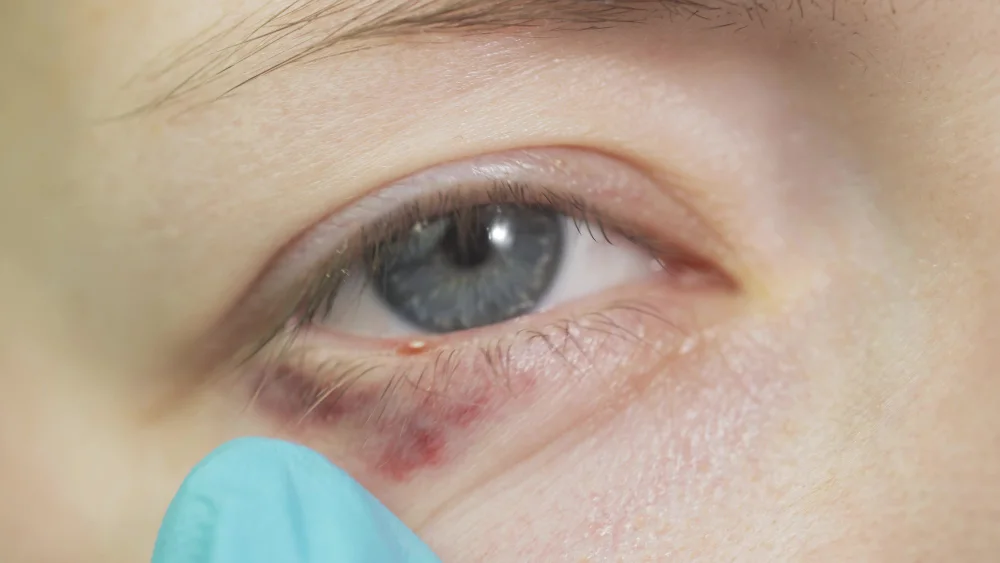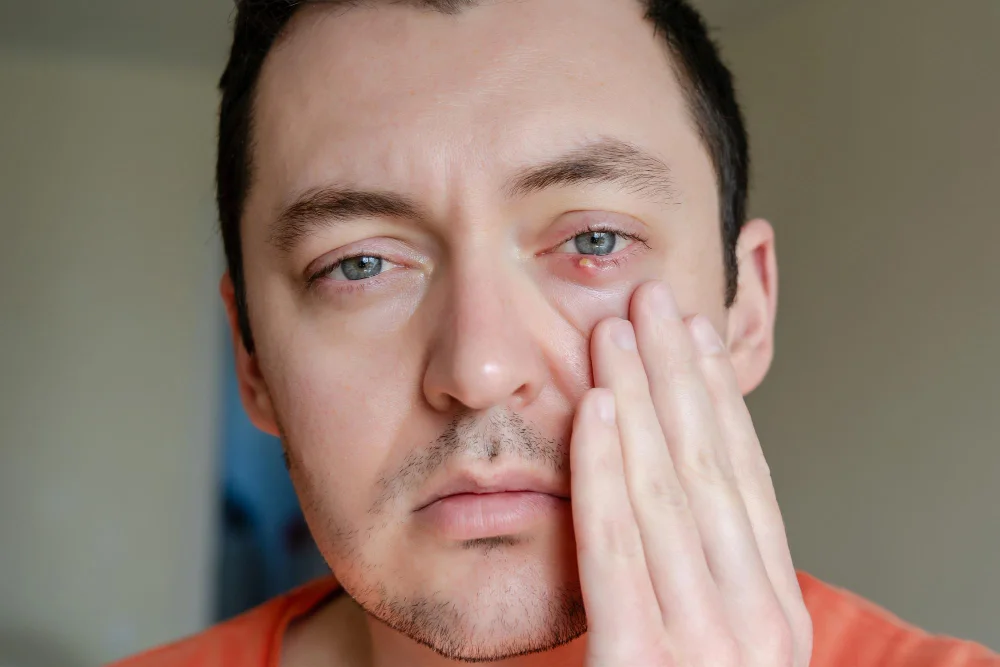
Among different eye diseases affecting vision and quality of life, blepharitis is a common condition. According to a study, almost 37% to 50% of people suffer from this condition at some point in their lives. This significant ratio makes it necessary for everyone to know about the root cause of this eye disease along with its symptoms and treatment.
There is a common concern: Is blepharitis contagious? To get information about the basics of blepharitis, keep reading this blog.
What is Blepharitis?
Blepharitis means inflammation of your eyelid. The inflammation is specifically in the area where follicles of eyelashes reside. In this frustrating condition, most people also develop a small lump on their eyelid. It makes your eyes red, swollen, and itchy. Also, this condition usually affects both your eyes.
Blepharitis is of two types:
- Anterior Blepharitis: It occurs at the exterior part of your eyelid and is caused by bacterial infection and different allergies.
- Posterior Blepharitis: It occurs on the inner side of your eyelid and happens because of dysfunction of oil glands caused by common skin conditions like rosacea and scalp dandruff.
Can Blepharitis Spread to Others?

Now, here comes the major concern about blepharitis: whether it is contagious or not. Well, the clear answer to this question is no – blepharitis is not contagious. That means it can not spread from one person to another, like pink eye or flu. In fact, it is entirely an inflammatory condition. However, if you leave this eye disease untreated, it can lead to other contagious eye infections.
How Do You Get Blepharitis?
Now let’s discuss some of the potential causes of blepharitis:
- Bacterial Infection: It is the most common cause of blepharitis. Though bacteria are present naturally on your face and eyelids, if they overgrow, it can lead to blepharitis.
- Rosacea: According to a 2021 study in South Korea, people who suffer from rosacea are more likely to have dry eyes, glaucoma, blepharitis and pink eyes. Rosacea is actually a skin condition that causes flushing and redness on your face and affects your eyes as well.
- Seborrheic Dermatitis: In this condition, you have redness and dandruff on your scalp and eyebrows and it can cause blepharitis. Mostly, people with anterior blepharitis suffer from seborrheic dermatitis.
- Malfunctioning Eye glands: They are another cause of blepharitis. When oil in your glands gets clogged and does not flow freely, it leads to dry eyes and chronic blepharitis. According to a study 75% of people suffering from blepharitis have malfunctioning oil glands.
- Allergies: One of the most common causes of blepharitis is seasonal allergies like allergy to tree pollen, grass pollen etc.
- Eyelash Mites: If you have eyelash mites, they can interfere with your oil glands, which leads to blepharitis.
Symptoms of Blepharitis Eye Disease
Suppose you are suffering from blepharitis because of any of the above-mentioned causes; you will observe the following symptoms in your body:
- Swollen Eyelids
- Redness or irritation in the eyes
- Dry Eyes
- Crusting of eyelashes
- Blurred vision
- Sensitivity to light
- Excessive blinking of eyes
- Loss of eyelashes
How to Prevent Blepharitis?
Medical experts have provided some basic steps to prevent blepharitis. These include:
- You should clean your eyelids twice a day if you are suffering from blepharitis and once a day if you don’t have any symptoms of this eye condition.
- If you feel any of the symptoms of blepharitis, stop wearing contact lenses and eye makeup to prevent the situation from getting worse.
Some other precautions include:
- Never touch your eyes or face with dirty hands.
- Make it a habit to wash your hands frequently.
- Ensure that your pillows and bedsheets are cleaned properly.
- Always disinfect your lenses with a contact solution after every use.
- Replace your expired makeup in a timely to avoid any kind of eye infection.
How Doctors Treat Eye Disease Blepharitis?
After going through a comprehensive eye exam and all the required tests, your eye care professional will suggest you any of the following treatments:
- Antibiotics: They prescribe antibiotics, ointment, or eye drops to reduce bacterial infection and cure blepharitis. For severe conditions, they may prescribe oral antibiotics as well.
- Antiinflammatories: Depending on your eye condition, if you need a stronger medicine, doctors may prescribe you steroid eye drops for instant relief of all eye infections.
- Root Cause Treatment: Doctors suggest treatment depending on the cause of blepharitis. If it is caused by rosacea or dry eyes, they would first treat these root causes by prescribing certain medications.
Conclusion
Though blepharitis is not contagious, you should not take this eye condition lightly. If left untreated, it can cause severe complications like keratitis, conjunctivitis, and many corneal problems. With proper hygiene and following the above-mentioned precautions, you can easily treat blepharitis.
If symptoms are persistent or getting worse, don’t waste a moment; contact a professional eye care center like Eye Lasik Austin. We provide the best possible care and an honest pre-procedural evaluation to suggest the right treatment.
Set an initial consultation today and get ready to enjoy healthier eyes!
FAQS
Yes, there are many home remedies for this condition. These include using a warm compress on your eyes, washing them with mild baby shampoo, and frequently giving your eyelids gentle massages.
Yes, a healthy diet that includes omega-3 fatty acids can improve your overall eye health and reduce inflammation.


